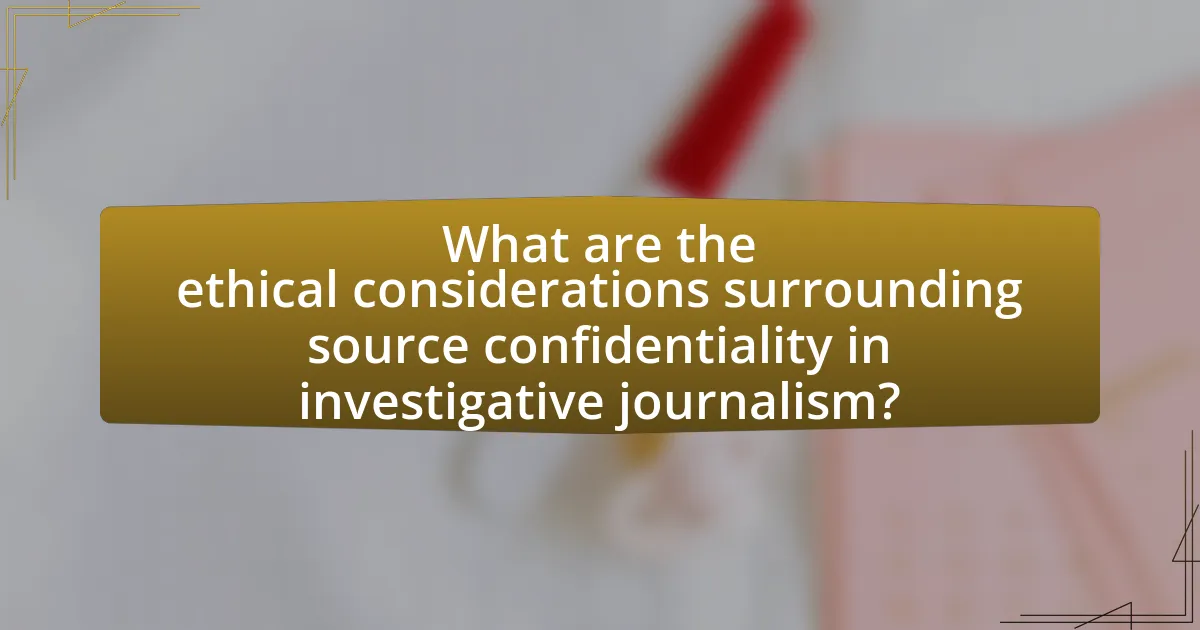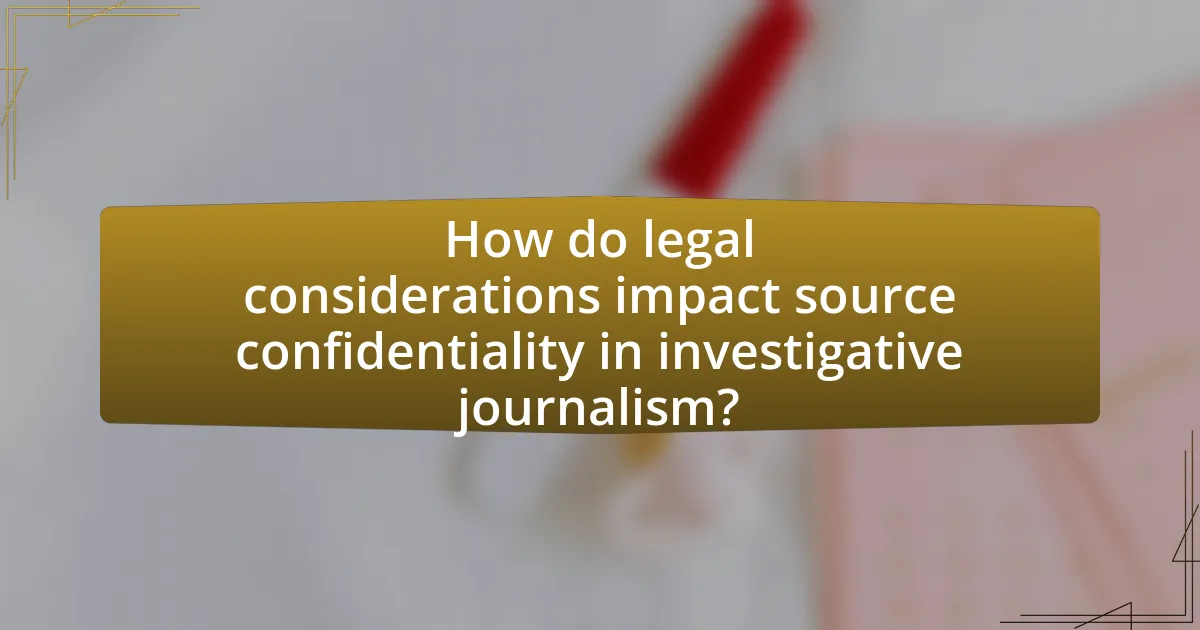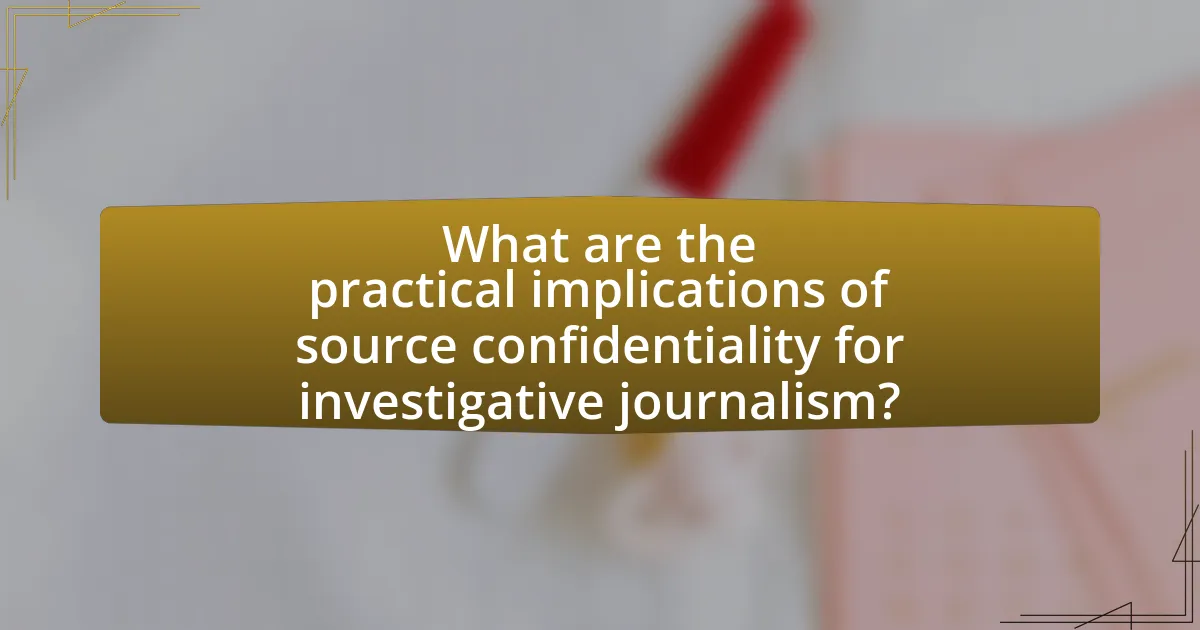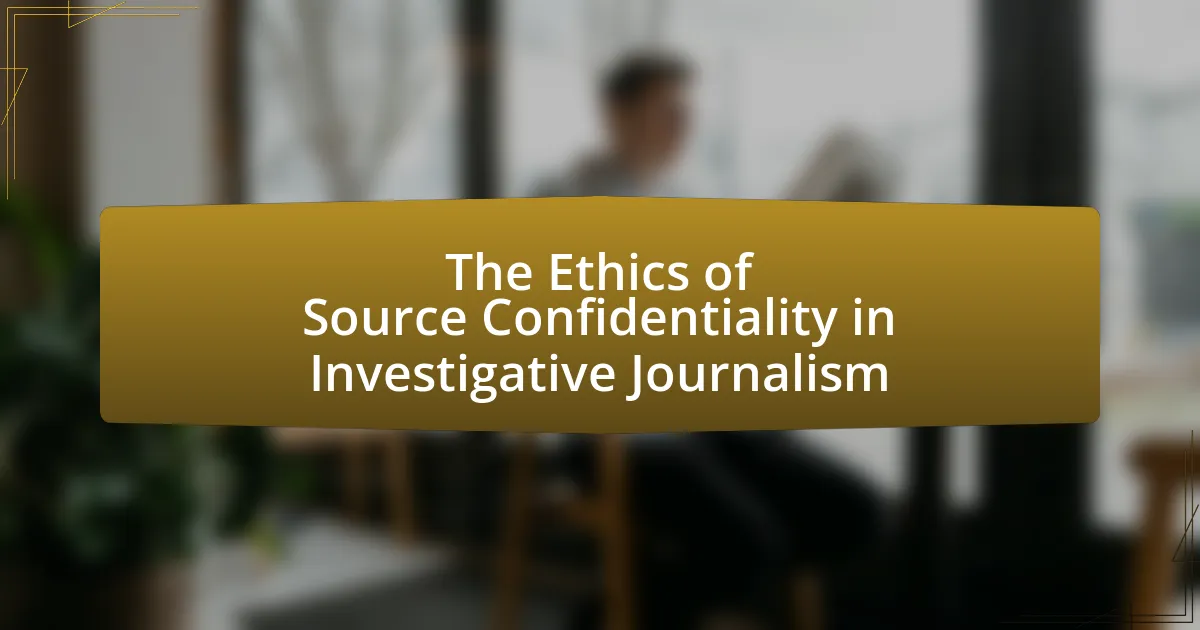The article examines the ethical considerations surrounding source confidentiality in investigative journalism, emphasizing the importance of protecting sources to ensure their safety and the integrity of the journalistic process. It discusses the moral obligations of journalists, supported by ethical frameworks and legal protections such as shield laws, which allow journalists to refuse to disclose sources in court. The article highlights the significance of source confidentiality in fostering trust, encouraging whistleblowers, and enhancing the quality of investigative reporting, while also addressing the risks journalists face when revealing sources and the potential consequences of breaching confidentiality. Additionally, it outlines best practices for maintaining source confidentiality and the tools journalists can use to secure communications with sources.

What are the ethical considerations surrounding source confidentiality in investigative journalism?
The ethical considerations surrounding source confidentiality in investigative journalism primarily involve the protection of sources to ensure their safety and the integrity of the journalistic process. Journalists have a moral obligation to safeguard the identities of their sources, especially when those sources risk personal harm or legal repercussions for providing information. This ethical stance is supported by the Society of Professional Journalists’ Code of Ethics, which emphasizes the importance of maintaining the confidentiality of sources to foster trust and encourage the flow of information essential for public interest reporting. Additionally, legal protections, such as shield laws in various jurisdictions, reinforce the ethical imperative by providing journalists with the right to refuse to disclose sources in court, thereby upholding the principle of free press and the public’s right to know.
Why is source confidentiality important in investigative journalism?
Source confidentiality is crucial in investigative journalism because it protects the identities of whistleblowers and sources, enabling them to provide sensitive information without fear of retaliation. This confidentiality fosters trust between journalists and their sources, encouraging the flow of information that is vital for uncovering corruption, abuse, and other societal issues. Historical examples, such as the Watergate scandal, demonstrate that confidential sources can lead to significant revelations that impact public policy and accountability. By safeguarding source identities, investigative journalism can operate effectively, ensuring that critical stories come to light while maintaining ethical standards.
What risks do journalists face when revealing sources?
Journalists face significant risks when revealing sources, including legal repercussions, loss of trust, and potential harm to the source. Legal repercussions can manifest as subpoenas or lawsuits, as seen in cases like Judith Miller, who was jailed for refusing to disclose a source. Loss of trust occurs when sources fear exposure, leading to fewer whistleblowers willing to come forward, which undermines investigative journalism. Additionally, revealing a source can expose them to threats or retaliation, particularly in sensitive political or criminal contexts, as highlighted by the dangers faced by sources in authoritarian regimes.
How does source confidentiality protect whistleblowers?
Source confidentiality protects whistleblowers by ensuring their identities remain undisclosed, which mitigates the risk of retaliation from employers or other parties. This protection encourages individuals to report misconduct without fear of personal or professional repercussions. Legal frameworks, such as the Whistleblower Protection Act in the United States, provide safeguards that reinforce this confidentiality, allowing whistleblowers to disclose information about illegal or unethical activities while maintaining their anonymity. Studies indicate that when confidentiality is assured, the likelihood of individuals coming forward with critical information increases, thereby enhancing accountability and transparency in organizations.
What ethical frameworks guide journalists in maintaining source confidentiality?
Journalists are guided by several ethical frameworks in maintaining source confidentiality, primarily the principles of truthfulness, accountability, and respect for privacy. The Society of Professional Journalists (SPJ) Code of Ethics emphasizes the importance of protecting confidential sources to foster trust and ensure the free flow of information. Additionally, the ethical principle of minimizing harm dictates that journalists should safeguard the identities of sources who may face repercussions for their disclosures. This framework is supported by legal protections in many jurisdictions, such as shield laws, which provide journalists with the right to refuse to disclose sources in legal proceedings, reinforcing the ethical obligation to maintain confidentiality.
How do different journalistic codes of ethics address source confidentiality?
Different journalistic codes of ethics address source confidentiality by emphasizing the protection of sources to foster trust and ensure the free flow of information. For instance, the Society of Professional Journalists (SPJ) Code of Ethics states that journalists should “protect the confidentiality of sources when the information is obtained in confidence.” Similarly, the American Press Institute highlights that safeguarding sources is crucial for investigative journalism, as it encourages whistleblowers to come forward without fear of retribution. These codes collectively underscore the importance of maintaining source confidentiality as a fundamental ethical obligation, thereby reinforcing the integrity of journalism and the public’s right to know.
What role does public interest play in ethical decision-making regarding sources?
Public interest serves as a fundamental criterion in ethical decision-making regarding sources in investigative journalism. It guides journalists in determining whether the information obtained from sources justifies potential risks to those sources, especially when confidentiality is at stake. For instance, when a source provides information that exposes corruption or wrongdoing, the public interest in transparency and accountability may outweigh the need for confidentiality, prompting journalists to consider the ethical implications of revealing the source’s identity. This principle is supported by ethical guidelines from organizations like the Society of Professional Journalists, which emphasize the responsibility to seek the truth and report it, balancing the need for confidentiality with the public’s right to know.

How do legal considerations impact source confidentiality in investigative journalism?
Legal considerations significantly impact source confidentiality in investigative journalism by establishing the boundaries within which journalists can protect their sources. Laws such as shield laws in various jurisdictions provide legal protections for journalists to refuse to disclose their sources in court, thereby encouraging whistleblowers to come forward without fear of retribution. For instance, the U.S. has varying state shield laws that grant journalists the right to keep their sources confidential, which is crucial for investigative reporting that often involves sensitive information. However, legal challenges can arise when courts prioritize the public’s right to know over source confidentiality, as seen in cases where journalists are compelled to reveal sources during criminal investigations. This legal landscape creates a complex environment where journalists must navigate between ethical obligations to protect sources and legal requirements that may demand disclosure.
What laws protect journalists’ sources in various jurisdictions?
Laws protecting journalists’ sources vary significantly across jurisdictions. In the United States, the First Amendment provides a degree of protection, while many states have enacted shield laws that specifically protect journalists from revealing their sources in legal proceedings. For example, California’s shield law allows journalists to refuse to disclose sources in most circumstances. In the United Kingdom, the Contempt of Court Act 1981 offers some protection, but it is limited and can be overridden by public interest considerations. In Canada, the Supreme Court has recognized a common law journalist-source privilege, which can be challenged in cases of serious crime or national security. These laws are designed to uphold the principle of source confidentiality, which is essential for investigative journalism, allowing journalists to gather information without fear of retribution against their sources.
How do shield laws vary across different countries?
Shield laws vary significantly across different countries in terms of their scope, protections, and enforcement mechanisms. For instance, in the United States, shield laws exist at both federal and state levels, offering varying degrees of protection to journalists against revealing their sources, with some states providing stronger protections than others. In contrast, the United Kingdom does not have a comprehensive shield law; instead, protections for journalists are derived from common law and specific statutes, which can be less robust. Countries like Canada have enacted specific shield laws that protect journalists from being compelled to disclose sources, but these laws can be subject to exceptions, particularly in cases involving national security. Additionally, some countries, such as Germany, have strong legal protections for journalists, while others may lack formal shield laws altogether, leaving journalists vulnerable to legal pressures. This variation reflects differing cultural attitudes towards press freedom and the balance between transparency and confidentiality in journalism.
What legal challenges do journalists face when refusing to disclose sources?
Journalists face significant legal challenges when refusing to disclose sources, primarily including potential contempt of court charges and the risk of being compelled to reveal information through subpoenas. Courts may enforce subpoenas that require journalists to disclose their sources, particularly in criminal cases, which can lead to legal penalties if the journalist does not comply. Additionally, the lack of a federal shield law in the United States means that protections for journalists vary by state, creating a patchwork of legal standards that can complicate their ability to maintain source confidentiality. For instance, some states have strong shield laws that protect journalists, while others do not, increasing the risk of legal repercussions for journalists who refuse to disclose sources in jurisdictions with weaker protections.
How can journalists navigate conflicts between legal obligations and ethical responsibilities?
Journalists can navigate conflicts between legal obligations and ethical responsibilities by prioritizing transparency and seeking legal counsel when necessary. This approach allows journalists to understand the legal implications of their reporting while adhering to ethical standards that protect sources and promote public interest. For instance, the Society of Professional Journalists emphasizes the importance of protecting confidential sources, which can sometimes conflict with legal demands for disclosure. By balancing these aspects, journalists can make informed decisions that uphold both their legal duties and ethical commitments.
What strategies can journalists employ to protect their sources legally?
Journalists can employ several strategies to legally protect their sources, including using confidentiality agreements, invoking shield laws, and utilizing anonymous communication methods. Confidentiality agreements can establish a legal framework that assures sources their identities will remain protected. Shield laws, which exist in many jurisdictions, provide legal protections for journalists against being compelled to disclose their sources in court. Additionally, journalists can use encrypted messaging apps and secure email services to communicate with sources, minimizing the risk of exposure. These strategies are supported by legal precedents that affirm the importance of source confidentiality in promoting free speech and a robust press.

What are the practical implications of source confidentiality for investigative journalism?
Source confidentiality is crucial for investigative journalism as it protects whistleblowers and encourages the flow of information. When journalists assure sources that their identities will remain confidential, it fosters trust and increases the likelihood that individuals will come forward with sensitive information about corruption, misconduct, or illegal activities. For instance, the landmark case of the Pentagon Papers demonstrated how source confidentiality allowed for the exposure of government deception, ultimately leading to significant political consequences. Furthermore, legal protections for journalists, such as shield laws in various jurisdictions, reinforce the importance of maintaining source confidentiality, as they provide a legal framework that supports journalists in safeguarding their sources against subpoenas and other legal pressures. This confidentiality not only enhances the quality of investigative reporting but also upholds the public’s right to know, thereby reinforcing democratic accountability.
How does source confidentiality affect the quality of investigative reporting?
Source confidentiality significantly enhances the quality of investigative reporting by encouraging whistleblowers and sources to provide sensitive information without fear of repercussions. When journalists can assure their sources that their identities will remain protected, it fosters an environment where critical information can be disclosed, leading to more thorough and impactful investigations. For instance, the Watergate scandal, which was uncovered through confidential sources, exemplifies how source protection can lead to significant revelations that hold powerful entities accountable. This confidentiality not only aids in gathering vital information but also upholds journalistic integrity by prioritizing the safety of individuals who contribute to the public’s right to know.
What are the potential consequences of breaching source confidentiality?
Breaching source confidentiality can lead to severe consequences, including legal repercussions, loss of trust, and harm to the source. Legal repercussions may involve lawsuits or criminal charges against journalists or media organizations, as many jurisdictions have laws protecting journalistic sources. Loss of trust occurs when sources become reluctant to share information, fearing exposure, which undermines investigative journalism’s effectiveness. Additionally, harm to the source can manifest as retaliation, harassment, or even physical danger, particularly in sensitive cases involving whistleblowers or dissenters. These consequences highlight the critical importance of maintaining source confidentiality in investigative journalism.
How can journalists build trust with sources to ensure confidentiality?
Journalists can build trust with sources to ensure confidentiality by establishing clear communication and demonstrating reliability. By being transparent about their intentions and the potential risks involved, journalists can create an environment where sources feel safe sharing sensitive information. Research indicates that maintaining consistent contact and following through on promises enhances trust; for instance, a study by the American Press Institute found that 70% of sources are more likely to share information when they believe journalists respect their confidentiality. Additionally, journalists should use secure communication methods to protect the identity of their sources, further reinforcing trust and encouraging openness.
What best practices should journalists follow to maintain source confidentiality?
Journalists should implement several best practices to maintain source confidentiality, including using secure communication methods, limiting the sharing of source information, and establishing trust with sources. Secure communication methods, such as encrypted messaging apps, protect the content of conversations from unauthorized access. Limiting the sharing of source information to only those who need to know minimizes the risk of exposure. Establishing trust involves being transparent about how information will be used and ensuring that sources understand the potential risks involved. These practices are essential for safeguarding the identities of sources, which is critical for ethical journalism and protecting whistleblowers.
What tools and techniques can journalists use to secure communications with sources?
Journalists can use encrypted messaging apps, secure email services, and virtual private networks (VPNs) to secure communications with sources. Encrypted messaging apps like Signal and WhatsApp provide end-to-end encryption, ensuring that only the sender and recipient can read the messages. Secure email services, such as ProtonMail, offer encryption for emails, protecting the content from unauthorized access. Additionally, VPNs help journalists maintain anonymity and secure their internet connection, making it difficult for third parties to intercept communications. These tools are essential for protecting source confidentiality and maintaining trust in investigative journalism.
How can journalists effectively document and manage confidential sources?
Journalists can effectively document and manage confidential sources by implementing secure communication methods, maintaining detailed records, and establishing clear agreements regarding confidentiality. Secure communication methods, such as encrypted messaging apps, protect the identity of sources and the information shared. Maintaining detailed records, while ensuring that these records are stored securely and access is limited, allows journalists to track interactions and verify information without compromising source anonymity. Establishing clear agreements with sources about the extent of confidentiality and the circumstances under which information may be disclosed further strengthens the trust and ethical considerations in the relationship. These practices are supported by the Society of Professional Journalists’ Code of Ethics, which emphasizes the importance of protecting sources and their privacy.

Leave a Reply